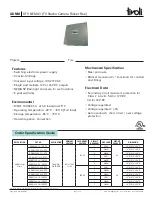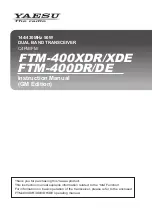
05-3946A01, Rev. C
TransNET OEM Integration Guide
I-5
antenna and feedline selection 13
antenna SWR check 16
connecting data equipment to DATA
INTERFACE connector 34
connecting PC and radios for
network-wide diagnostics 62
enabling sleep mode
installation 11–15
interference check 17
mounting the transceiver 11–12
network-wide diagnostics 62
performance optimization 15
performing network-wide
diagnostics 62
programming radio for network-wide
diagnostics 62
troubleshooting 58–61
Programming radio 41–57
as root or node 62
PWR command (set/display RF forward
output power) 50
R
Radio
inoperative (troubleshooting
chart) 61
no synchronization with master
(troubleshooting chart) 61
poor performance (troubleshooting
chart) 61
Radio Operating Mode (MODE)
Command 49, 50
Radio Receive Test Frequency
Command (RX) 52
Radio Serial Number Command
(SER) 53
Radio Transmit Test Frequency
(TX) 56
Radio Transmitter Hop Timing
(HOPTIME) 46
Radio Transmitter Power Level (PWR)
Command 50
Radio’s Internal Temperature
Command (TEMP) 56
Radio-MODEM Behavior (DEVICE)
Command 45
Receive Data Timeout-Timer Command
(RXTOT) 52
Received Signal Strength Indicator
Command (RSSI) 51
Remote radio
default settings 47
Remote station
typical arrangement, illustrated 76
Remote Terminal Unit Simulator
Command (RTU) 52
Repeater Operation. See
Store-and-Forward (SAF)
Restore to Factory Defaults (INIT) 46
Root (radio diagnostics type) 46
RSSI command (display received signal
strength) 51
RTU command (enable/disable internal
RTU) 52
RX command (set/display test receive
frequency) 52
RXD Command 52
RXD Delay Command (RXD) 52
RXTOT command (set/display received
data timeout value) 52
S
SAF command (store-and-forward) 53
Seamless Mode Emulation 31
Security Code (CODE) Command 43
SER Command 53
Set
alarm output sense (ASENSE
command) 42
alarm output signal (AMASK
command) 42
CTS hold timer (CTSHOLD
command) 44
CTS line response timer (CTS
command) 44
data interface baud rate (BAUD
command) 42
DCE or CTS Key device behavior
(DEVICE command) 45
frequency zone to skip (SKIP
command) 54
hoptime (HOPTIME command) 46
network address (ADDR
command) 41
owner’s message (OWM
command) 50
owner’s name (OWN command) 50
radio mode (see MODE
command) 49
received data handling mode (BUFF




































